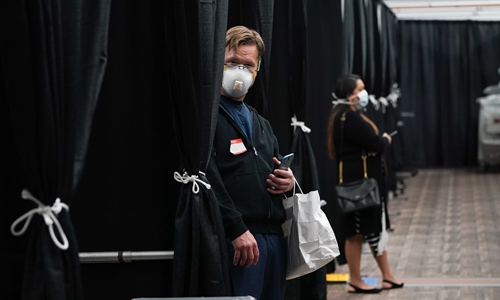
China's three largest cellphone carriers reported a drop of around 21 million users in the first two months of 2020. The number was viciously interpreted by some people in the West with ulterior motives as evidence that China has "concealed" the real COVID-19 death toll.
This claim is absurd, and any rational person will not buy it.
The Chinese companies have already explained that the drop may have been brought about by factors such as reduced business and social activities amid the coronavirus outbreak, and some users upgrading service from 4G to 5G, but the conspiracy is still circulating.
The SIM cards that are no longer being used would usually be reclaimed by the carriers after at least two months, which is to say if a large number of users stop using their cellphones in January and February, the data won't show until at least two months later. Besides, the March data already suggests that the number of users was rebounding.
At a critical moment in fighting the virus, most countries are devoting themselves to coping with the crisis. But some Western countries, especially the US, are concentrating on how many people have died in other countries. Their acts are abnormal and irresponsible. A lot more lives might have been saved if they had put the time and energy into handling the outbreak.
This ridiculous conspiracy theory about cellphone users is only one example. The New York Times reported on April 2 that "the CIA has been warning that China has vastly understated its coronavirus infections and that its count could not be relied upon as the US compiles predictive models to fight the virus."
This allegation is more nonsense. How were the "predictive models" compiled? Are they valid? Unless more data and more specific modeling approaches can be provided, such a conclusion is pure fiction.
Some US intelligence officials also claim that "bureaucratic misreporting" is a serious problem in China. Their understanding of the Asian power is seriously outdated and is based merely on their own suppositions.
In China, communication channels between the central and local governments are quite transparent and direct. It is almost impossible for local officials to hide the truth without being found out. Besides, Chinese officials are absolutely not a group of people who would jeopardize others' lives to save their own careers.
US intelligence agencies, media, and politicians have all engaged in rumor mongering regarding China's COVID-19 fight, an old trick of the US government: throwing mud at China and passing the buck. The US moves have three purposes.
First, to divert the public's attention. The number of confirmed cases in the US has topped 400,000. Failing to cope with the rampant epidemic within a short time, Washington has chosen to shift people's focus at home, including by waging public opinion wars against China and fabricating rumors. Some Chinese scholars are even concerned that the US might resort to extreme measures such as launching hot wars around the Chinese perimeter.
Second, to win support of voters. US President Donald Trump has managed to meet few of his promises since he assumed office. To win reelection, the president will need to explain why he failed and what he will do in the second term. Reading from Trump's playbook, his two ploys are likely to be: insisting that China is the one that should be blamed, and he will lead the US to keep confronting China. This pandemic has only made the tendency more obvious.
Third, to worsen China's investment environment. US politicians attach great importance to the stock market as it concerns the well-being of numerous ordinary American families, and thus their supporting rates. However, the coronavirus outbreak has made strong turbulence in the US stock market, exposing an extremely shaky investment environment. In contrast, China's is rather stable. Unable to control its own economic situation, the Trump administration hopes to worsen China's investment environment and drag China down by using all kinds of means, including smearing China.
The misinformation about China's "concealment" of data reveals the true feature of some in the US: They would focus more on their own personal benefits than the lives of their people.
The article was compiled by Global Times reporter Yan Yunming based on an interview with Zhang Yifei, assistant research fellow with the Institute of American Studies of the Chinese Academy of Social Sciences.













